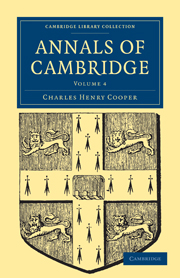GEORGE THE FOURTH
Published online by Cambridge University Press: 29 August 2010
Summary
1820.
King George the Fourth was proclaimed by the University author rities on the 3rd of February, by the Mayor and Corporation on the 4th, and by John Hall Esq. High Sheriff of the County on the 5th.
On the 15th of February, the University voted an Address to the King, congratulating him on his accession. It was presented at Carlton House, on the 28th of April, by his Royal Highness the Duke of Gloucester Chancellor, the Earl of Hardwicke High Steward, Mr. Serjeant Frere Vicechancellor, eleven other Heads of Colleges, and a deputation from the Senate, accompanied by his Royal Highness the Duke of Sussex, the Marquess of Lansdowne, the Marquess Camden, the Marquess Huntley, the Earl of Westmoreland, Earl Nelson, Viscount Palmerston M.P., Lords Brecknock, Bridport, Compton, Grey, and Hervey, the Archbishop of Canterbury, the Bishops of Bangor, Chester, Ely, Exeter, and Salisbury, Hon. C. J. Shore, Hon. and Rev. Gerard Noel, Sir J. R. Eustace, Hon. and Rev. G. Wellesley, and about 500 other members of the University.
On Wednesday, the 16th of February, being the day of the funeral of King George the Third, all the shops were closed, and there was divine service in all the churches and other places of worship. The University went in procession to Great St. Mary's, where, after the Litany had been read by the Junior Proctor, a sermon was preached by Dr. John Kaye Regius Professor of Divinity, from Prov. xx. 8.
- Type
- Chapter
- Information
- Annals of Cambridge , pp. 527 - 565Publisher: Cambridge University PressPrint publication year: 2009First published in: 1845



